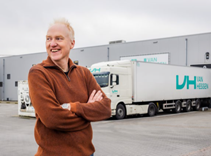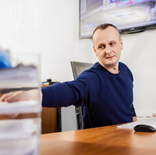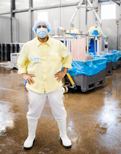A day in the salting plant
Right at the point where the Dutch provinces of Limburg, North Brabant, and Gelderland meet – and just a stone-throw away from the German border – is the location of Van Hessen’s salting plant in the Netherlands. In the town of Cuijk, a dedicated team oversees an important phase in the processing of natural casings. Let’s Meat visited the plant and got into an interesting conversation. Despite the mandatory online setting of a video conference call due to Covid, we have a lively exchange. Olaf Peters (manager production), Piotr Dwojak (team leader), and Mohammed Ibrahim (team leader) are ready to explain with enthusiasm what the salting process is all about.

What exactly is a salting factory? In the seventeenth century seafaring ships had to brine their meat but these days this is no longer necessary, or is it?
Olaf: “Well, actually, yes! Conservation of meat is still best done by salting it. Our products still go to “The East” by ships, except today these ships sail for Van Hessen and they go all over the world. Of course, we do not brine the meat for our own consumption. Rather, we salt casings to make sure they arrive at the selection plants in perfect condition. There they are calibrated for quality and diameter. If our selection plants do not receive perfect quality, a large percentage of the product gets lost. Additionally, a significant part of the production cycle will have been operating in vain.
“Hence the salting. We are a link in the production chain of natural casings. We receive and process the casings. After this is done, we ship the casings to our selection facilities in various parts of the world. So, this is where it happens,” says Olaf, not without pride in his voice. “We also check the casings, “ adds Piotr. “That is one of our most important tasks. If we don’t check properly and provide feedback, inferior casings could end up in our selection facilities with the people there having to conclude that the casings don’t meet the required quality. When that happens, we are several weeks down the road. All this time, the gutroom from where the problem originated has not been aware of it. It is nice for gutrooms to hear that they are doing okay, but they insist on being informed when certain aspects emerge that require special attention. Mistakes or deviations can so easily slip in. It is our job to notice this.”
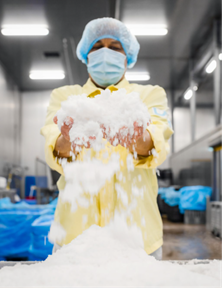
But sausages are not salty when you eat them. So how does this work?
Olaf explains: “Look, if you can salt something, there are also ways to take the salt away. And that is what we do. Or to be precise, our people in the selection facilities do this. You can, for instance, get rid of the salt by putting the casings in a 24-hour water bath. Interestingly, right after calibration, the casings are salted once again. This time, the salt is removed just before the final processing in the sausage factory or even at the butcher.
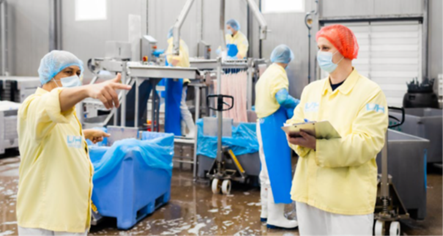
Which place does the salting plant have in Van Hessen’s strategy?
“Quite simple,” says Olaf, “The moment you don’t salt the casings, you’re going to miss a lot of casings each week. To be more precise, if the casings are delivered here in good condition and we don’t treat them the way they deserve, an entire shipment of casings in poor condition arrives at our selection plants. By that time, it becomes very hard to restore the damage. On the other hand, if we receive casings in poor condition we are often able to restore them partly and sometimes entirely to their proper condition so they can still be calibrated. If we observe an issue in a shipment, we can call the gutroom the very same day so they can adjust their process. At that point, you’re still talking about a very short production cycle which means the damage is limited. Together we ensure the quality of our product.
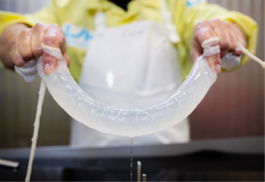
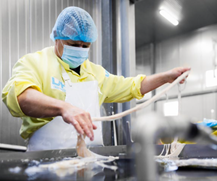
When are you satisfied? Given your different expertise, this probably means a different answer for each of you.
“When everything goes smoothly I’m satisfied. That is not easy to achieve because there are so many moving parts in this line of work and something can go wrong so easily. But we keep trying,” says Mohammed while throwing his hands in the air, “trying, trying, trying!”
“For me, the most important thing is that my people are doing well. When they can work in a pleasant environment they are also proud of their work and that results in good quality labor,” Piotr says with conviction. Olaf agrees: “Piotr is for real. He always tries to make work just a little more attractive because he wants ‘his’ people to be okay.” “My people come first for me,” says Piotr, “My job is not only a 6:00 am to 3:00 pm job; it is my passion. I’m grateful to Van Hessen for giving me the space to grow and allowing me to make something beautiful of my career.”
“As far as I’m concerned,” concludes Olaf, “I’m satisfied when everything is safe. We have a lot of machines here; it is heavy work and forklift trucks are riding around. An accident can happen so easily. I’m also happy when our people are proud of their product. That automatically leads to a “good” product … as well as happy colleagues in our selection plants,” laughs Olaf.
